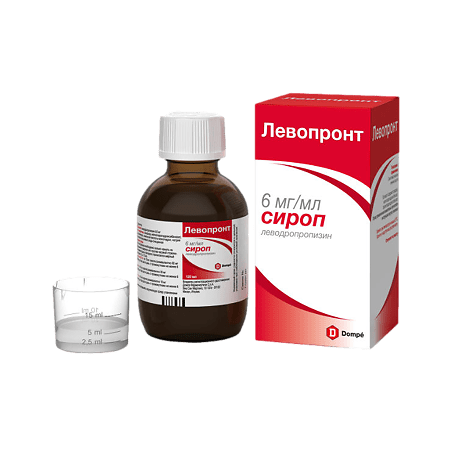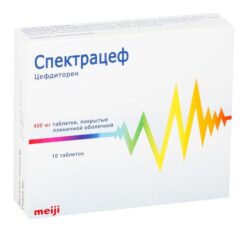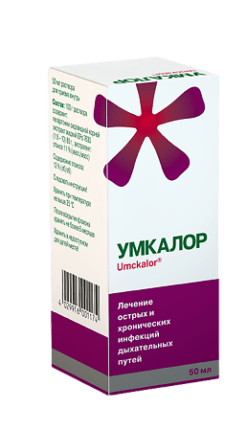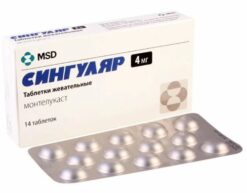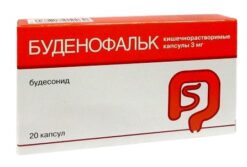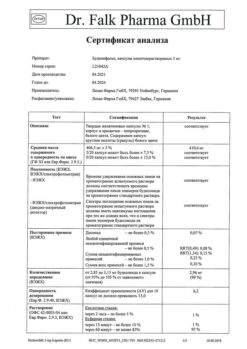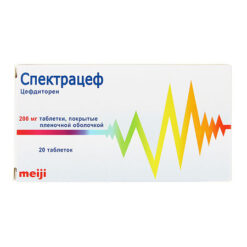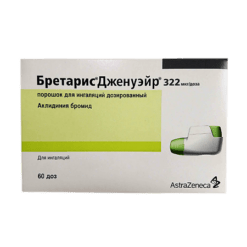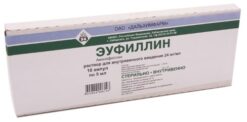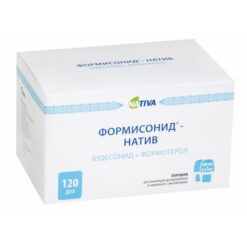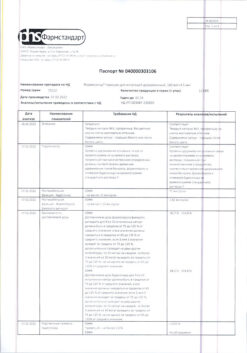No products in the cart.
Levopront, 6 mg/ml syrup 120 ml
€15.51 €12.93
Description
Pharmacotherapeutic group: other antitussive drugs
ATX code: R05DB27
Pharmacological properties
Pharmacodynamics
A cough suppressant. Anticough activity is caused by peripheral action on tracheobronchial tree. The mechanism of the anti-cough action of levodropropyzine is to inhibit nerve impulse transmission within the C-fibers by inhibiting the release of neuropeptide sensors from the C-fibers in vitro.
The drug does not cause suppression of the respiratory center and does not affect mucociliary clearance in humans. In patients with chronic respiratory failure, levodropropyzine has no suppressive effect on the respiratory system during both spontaneous breathing and hypercapnic ventilation.
Pharmacokinetics
The bioavailability of levodropropyzine when taken orally is over 75%.
Levodropropyzine is rapidly absorbed and distributed in the human body after oral administration.
The binding to plasma proteins is low (11-14%).
Half-life is 1-2 hours. It is excreted by the kidneys both as unchanged and as metabolites (conjugated levodropropyzine and conjugated rhydroxylevodropyzine). After 48 hours, excretion of levodropropyzine and the above metabolites by the kidneys is about 35% When repeated administration of the drug no changes in pharmacokinetic parameters and cumulation of levodropropyzine were noted.
Significant changes in pharmacokinetic profile in children, elderly patients, patients with renal dysfunction of mild or moderate severity have not been identified.
Indications
Indications
Symptomatic treatment of dry (non-productive) cough of various etiologies.
Pharmacological effect
Pharmacological effect
Pharmacotherapeutic group: other antitussives
ATX code: R05DB27
Pharmacological properties
Pharmacodynamics
Antitussive. Antitussive activity is due to a peripheral effect on the tracheobronchial tree.
The mechanism of the antitussive action of levodopropizine is to slow down the transmission of nerve impulses within C-fibers. In vitro, levodopropizine has been shown to inhibit the release of neuropeptides from C-fibers.
The drug does not cause depression of the respiratory center and does not affect mucociliary clearance in humans. In patients with chronic respiratory failure, levodopropizine does not have a suppressive effect on the respiratory system either during spontaneous breathing or during hypercapnic ventilation.
Pharmacokinetics
Bioavailability of Levodropropizine
Levodropropizine, after oral administration, is rapidly absorbed and distributed in the human body.
Binding to plasma proteins is insignificant (11-14%).
The half-life is 1-2 hours. It is excreted by the kidneys both unchanged and in the form of metabolites (conjugated levodropropizine and conjugated p-hydroxylevodropropizine). After 48 hours, renal excretion of levodopropizine and the above metabolites is approximately 35%. With repeated administration of the drug, no changes in the pharmacokinetic parameters and accumulation of levodopropizine were observed.
There were no significant changes in the pharmacokinetic profile in children, elderly patients, or patients with mild or moderate renal impairment.
Special instructions
Special instructions
The drug Levopront contains 4 g of sucrose per dose (10 ml), which should be taken into account in patients with diabetes mellitus. One dose contains 0.4 XE (bread units).
Levopront does not contain gluten.
Levopront contains methyl parahydroxybenzoate and propyl parahydroxybenzoate, which often lead to an allergic rash.
In general, propyl parahydroxybenzoates usually cause delayed-type allergic reactions such as contact dermatitis and, less commonly, immediate-type allergic reactions with manifestations of urticaria and bronchospasm.
Impact on the ability to drive vehicles and machinery
No studies have been conducted on the effect on the ability to drive vehicles and/or operate machinery. However, since the drug may, although rarely, cause drowsiness, caution should be exercised when driving or operating machinery.
Active ingredient
Active ingredient
Levodropropizine
Composition
Composition
Active ingredient: Levodropropizine 6.0 mg
Excipients:
Sucrose 400.0 mg
Methyl parahydroxybenzoate 1.3 mg
Propyl parahydroxybenzoate 0.2 mg
Citric acid monohydrate 9.6 mg
Sodium hydroxide 3.6 mg
Cherry flavor 2.5 mg
Purified water up to 1.0 ml
Pregnancy
Pregnancy
The drug Levopront is contraindicated during breastfeeding pregnancy.
Contraindications
Contraindications
Hypersensitivity to levodopropizine or other components of the drug
Diseases associated with bronchial hypersecretion (diseases associated with increased mucus production)
Decreased mucociliary function such as Kartagener’s syndrome, ciliary dyskinesia (patients suffering from problems with reduced mucus production in the airways from birth)
Pregnancy
Breastfeeding period
Children’s age (children under 2 years old)
Fructose intolerance, isomaltose deficiency
With caution
In patients with severe renal impairment (decreased renal function), creatinine clearance is less than 35 ml/min, in patients with severe liver dysfunction, in elderly patients, since their sensitivity to various drugs is generally altered, when taken simultaneously with sedatives, in patients with diabetes mellitus.
Cough medications treat symptoms only and should be used only until the underlying cause is diagnosed and/or until treatment for the underlying problem has worked.
Do not use the drug for long-term treatment. If after a short period of treatment no noticeable results are achieved, consult your doctor.
Side Effects
Side Effects
The frequency of adverse reactions is given in the following gradation (MedDRA classification by frequency of development): very often (≥1/10); often (≥1/100, <1/10); uncommon (≥1/1000, <1/100); rare (≥1/10000, <1/1000); very rare (< 1/10000); frequency unknown (cannot be estimated from available data).Immune system disorders: very rare: allergic and anaphylactic reactions, eyelid swelling, angioedema.Psychiatric disorders: very rare: irritability, frequency unknown: lethargy, personality changes or personality disorders.Nervous system disorders: very rare: episodes of fainting (short-term loss of consciousness), vertigo, tremor, tonic-clonic seizures and petit mal seizures. frequency unknown: gait instability, paresthesia (abnormal sensation on the skin, tingling).Visual disturbances: very rare: mydriasis (dilation of the pupil of the eye), frequency unknown: bilateral blindness (affects both eyes).Cardiac disorders: very rare: palpitations, tachycardia (rapid heartbeat), frequency unknown: atrial bigeminy (irregular heartbeat).Vascular disorders: very rare: hypotension (low blood pressure).Respiratory, thoracic and mediastinal disorders: very rare: shortness of breath (difficulty breathing), cough, edema of the airways (swelling).Gastrointestinal disorders: very rare: abdominal pain, nausea, vomiting, diarrhea. frequency unknown: stomach pain
Liver and biliary tract disorders: very rare: cholestatic hepatitis.
Metabolic and nutritional disorders: frequency unknown: hypoglycemic coma.
Skin and subcutaneous tissue disorders: very rare: urticaria, erythema (redness of the skin), exanthema (rash), itching, skin reactions, glossitis (inflammation of the tongue), aphthous stomatitis (painful sores in the mouth), frequency unknown: epidermolysis (a rare and potentially serious disease).
Musculoskeletal and connective tissue disorders: frequency unknown: weakness in the lower extremities; General disorders and disorders at the injection site: very rarely: general malaise, generalized edema (swelling), asthenia (physical weakness).
Interaction
Interaction
Levodropropizine does not enhance the pharmacological effect of drugs acting on the central nervous system (CNS) (for example, benzodiazepines, alcohol, phenytoin, imipramine), does not modify the effect of oral anticoagulants (for example, warfarin) and does not affect the hypoglycemic effect of insulin. However, in patients with individual hypersensitivity, a depressant effect on the central nervous system is possible when taking Levopront with sedatives.
Clinical studies have not demonstrated any drugs used in the treatment of diseases of the bronchopulmonary system, such as beta-2-adrenergic agonists, methylxanthines and their derivatives, glucocorticosteroids, antibiotics, mucolytics and antihistamines.
Tell your doctor or pharmacist if you are taking, have recently taken, or will take any other drugs.
Take this drug with caution and tell your doctor if you are taking sedatives to treat an anxiety disorder.
Overdose
Overdose
Symptoms: nausea, abdominal pain.
Treatment: symptomatic therapy using standard emergency measures (gastric lavage, taking activated charcoal, etc.).
Storage conditions
Storage conditions
At a temperature not exceeding 25 °C.
Keep out of reach of children
Shelf life
Shelf life
3 years
Manufacturer
Manufacturer
Dompe Pharmaceutici S.p.A., Italy
Additional information
| Shelf life | 2 years. Do not use after the expiration date printed on the package. |
|---|---|
| Conditions of storage | At a temperature not exceeding 25 o c. Store out of the reach of children. |
| Manufacturer | Dompe Pharmaceutici S.p.A., Italy |
| Medication form | syrup |
| Brand | Dompe Pharmaceutici S.p.A. |
Related products
Buy Levopront, 6 mg/ml syrup 120 ml with delivery to USA, UK, Europe and over 120 other countries.

